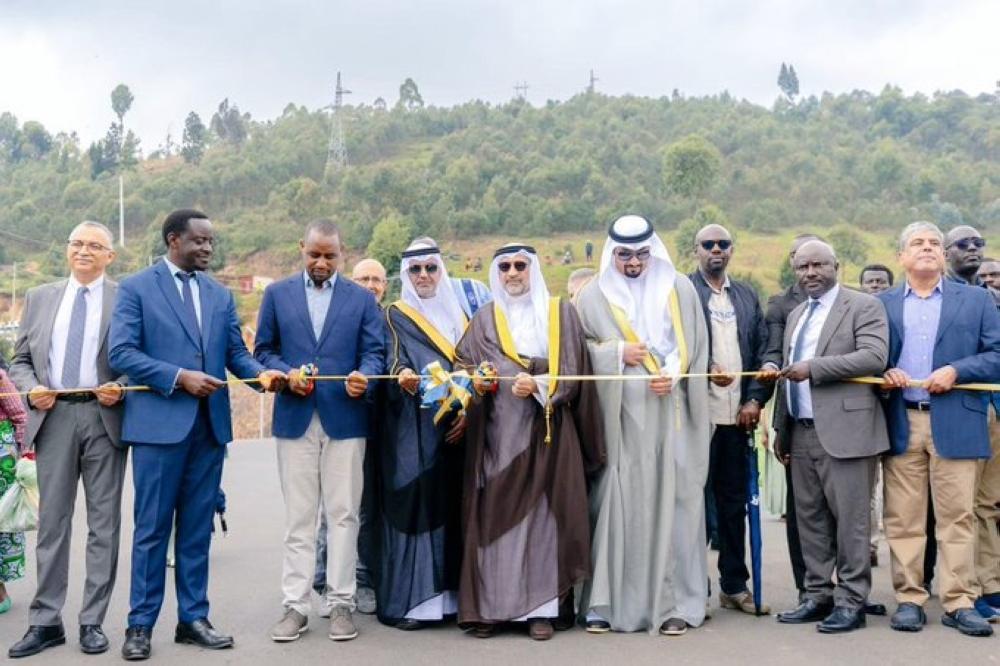Africa-Press – Rwanda. Residents living close to the newly completed roads inaugurated by the government have expressed hope that the projects will lower transport costs, boost trade, and increase property values.
The October 9 inauguration marked the completion of a 151km network, consisting 73km Nyagatare–Rukomo road, which began construction in 2019, 53km Huye–Kitabi road connecting Huye, Nyamagabe, Rusizi, and Nyamasheke districts, and the 25km Rubengera–Gisiza road.
Speaking about the roads, Ramadhan Habimana, a farmer from Nyagihanga Sector in Kirehe District, said the new Nyagatare-Rukomo road is making it easier to connect with neighbouring districts such as Gicumbi and Nyagatare. He noted that transport of goods, including cement and agricultural produce, has become more reliable.
“We are grateful to the government. Now we are set to develop faster since the road has been completed,” he said, adding that the value of their produce and land has risen significantly.
He says coffee prices, for instance, have increased from Rwf150 to Rwf850 per kilogramme, while the price of bananas has gone up to Rwf400 and beans to Rwf750 per kilogramme. He reckons that a plot of land that once cost around Rwf300,000 before the road construction now sells for up to Rwf1 million in some areas.
Habimana added that the improved infrastructure has stimulated small businesses, with more people able to access electricity and run shops and barbershops.
In Gatsibo District, Afissa Mukaturatsinze said residents can now travel more safely and at a lower cost. She explained that a motorbike ride that once cost Rwf700 now goes for Rwf300, while buses that were previously hard to find are now more frequent.
“It used to take us up to three hours to get a bus to Gicumbi, but now even at 6 p.m. we can still find one,” she said.
During the inauguration ceremony, Jean de Dieu Uwihanganye, the Minister of State in charge of Infrastructure, stressed that transport infrastructure is central to Rwanda’s economic transformation.
He explained that roads and other transport networks are the first catalyst for economic development, noting that the government invests in them to ensure that the benefits reach all citizens.
“When we build these roads and the infrastructure across the country, the intent is that it translates into real economic development and that real wealth is accumulated by the people of Rwanda. Inaugurating such roads means that the assets are there, but the next stage is making sure that the use of those assets translates into wealth creation,” Uwihanganye said, adding that signs of change are already visible in people’s lives along the new roads.
He highlighted ongoing projects across the country, including Byumba-Ngondore and Nyagatare-Rwempasha in the Eastern Province, where roads are also being built around the new Kigali International Airport to improve access. Roads linking Masaka to Kabukuba and the Bugesera airport to Nyamata, from Ngoma to Ramiro, are nearing completion.
In the south, the expansion of the Kigali-Muhanga road into four lanes is underway, while in Nyaruguru a road to the Shyiri border is being upgraded and tarmacked this year. The Western Province has multiple projects, such as the Ngororero-Nyakinama road, a presidential bridge initiative, and a road from Musanze through the Cyanika border to Rubavu, which is set to start soon.
Uwihanganye also noted that many other roads are being upgraded to asphalt and that the Ministry of Infrastructure ensures these investments translate into real economic gains for Rwandans.
According to Rwanda Transport Development Agency (RTDA), the projects were implemented by the Government of Rwanda in partnership with the Arab Bank for Economic Development in Africa (BADEA), the Saudi Fund for Development, the Kuwait Fund for Arab Economic Development and the OPEC Fund for International Development.
A total of 2,475 jobs were created, benefiting around three million residents within the project areas, according to the government.
The new infrastructure will not only enhance movement and economic exchange but also support climate-resilient development and raise the value of properties along the road corridors, RTDA said.
For More News And Analysis About Rwanda Follow Africa-Press






